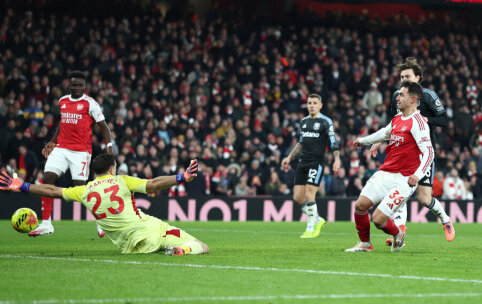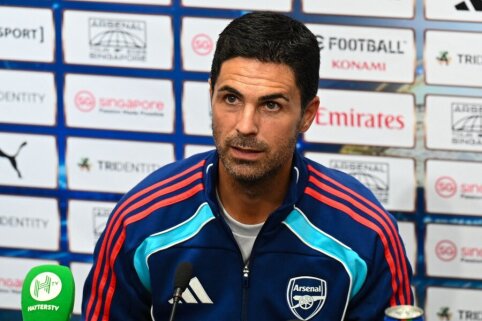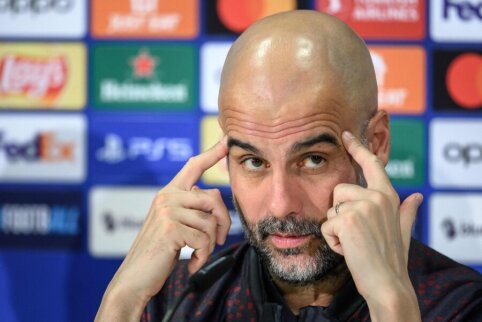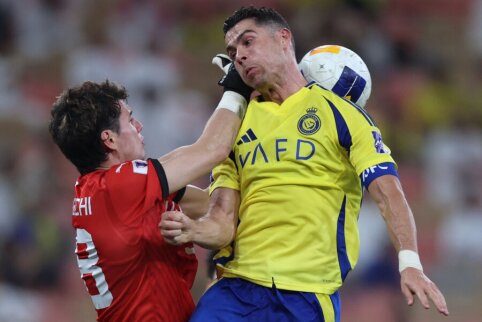 © EuroFootball.com
© EuroFootball.com
In the sixth decade in Hollywood, fantasy films were being created one after another, in which aliens (a sort of communist metaphor) threatened the World. In November 1953, like in one of those films, an alien appeared from the other side of the "Iron Curtain" and shook English football, helping to defeat the English on their own territory for the first time in 1066 years. One of the opponents on the field at that time stated that "he played as if he was from outer space."
That alien's name was Ferenc Puskas. He became one of the handful of players who had a huge impact on English football. While, for example, Pele's talent was undeniable, at least logical - he physically looked like a true athlete, not like a butcher. Meanwhile, F. Puskas' talent amazed many, including Rinus Michels, who coached "Ajax," which defeated F. Puskas-led Athens "Panathinaikos" in the 1971 European Cup final.
Even a player like Sir Bobby Charlton couldn't help but marvel at the Hungarian's talent. Moreover, the opponent was even intimidated by the Hungarian, as if threatening them with their own disappearance.
For F. Puskas, the football field was not a crowded place with people, but a million opportunities. Although he was not particularly known for his heading ability, and his game with his right foot was just slightly better than average, with his left foot he could do everything perfectly and simply could not miss.
"He was a killer. I haven't seen him shoot past a goalkeeper after breaking free. In fact, I haven't even seen him lose the ball in such a situation," shared Sir Bobby Charlton in his memories.
As a boy, F. Puskas trained for a long time practicing to hit targets blindfolded. In history, there is a record of how in 1971, already in his thirties and being a coach, F. Puskas dazzled Liverpool's strategist Bill Shankly and forced him to be amazed by hitting 12 shots from beyond the penalty area precisely into the same corner of the goal.
The biography of the most famous Hungarian player of all time, Gyorgy Szollosi, wrote in his book that one of the most impressive F. Puskas matches of all time was the aforementioned 6-3 victory against England at Wembley Stadium. "Feinting that he would shoot with his right foot, he flicked the ball onto his left foot, sent Billy Wright in the opposite direction, and with a strong shot into the top corner of the goal, disarmed England's goalkeeper Gil Merrick. Yes, twenty years before the famous "Cruyff turn," the term "Puskas goal" was born, which children in Hungary are still learning to replicate to this day."
Even if F. Puskas had not been one of the most talented players and played for one of the best national teams of all time, within which he scored 83 goals in 84 matches, his career would have still been impressive.
With his help, the Hungarian national team became Olympic champions in 1952, and the famous 6-3 victory against England caused a real revolution in English football. Coaches like Ron Greenwood and Malcolm Allison managed to learn the Hungarian lesson well, while Brazil adapted the Hungarian 4-2-4 tactical scheme and won the 1958 World Cup. Four years earlier at the World Cup in Switzerland, they reached the final, where they were defeated by West Germany.
In 1958, after an eighteen-month break, F. Puskas returned to top-level football and agreed to represent Real Madrid for 3,000 U.S. dollars per month. The famous striker had to sit out for an extended period of time after the Hungarian Football Federation together with FIFA suspended F. Puskas for refusing to return to Budapest, where Soviet tanks suppressed the revolution.
"This transfer is good for Puskas, but not for this old fat guy that I've become," F. Puskas wrote to a friend. "But I will become what I was." In Madrid, together with the famous Alfredo Di Stefano, F. Puskas created one of the best teams of all time, winning the Spanish championship six times and conquering Europe three times.
F. Puskas scored four goals in one of the most memorable European Cup finals in 1960 and helped Real Madrid defeat Frankfurt Eintracht 7-3. Representing Real in all tournaments, the forward scored 512 goals in 528 matches. Later, after accepting Spanish citizenship, the Hungarian played for the national team at the 1962 World Cup.
His football career was like a fairy tale – but a true one. In Hungary, it was as if he did not exist – all information about him was blocked by the communist regime. "Parents told their children stories about F. Puskas, but many Hungarians never even saw him play," G. Szollosi said.
Surprisingly, he became one of the first true global superstars. Although he was quite humble, he quietly enjoyed his success, looked more beautiful than anyone in the city, and always brushed his hair before matches and during breaks. F. Puskas ended his professional career in 1966. His decision was hastened by the massive amounts of fast food (he had a weakness for peanut butter) and the unattractive, practical style of football emerging in Europe.
F. Puskas is still well remembered 50 years after his reign in European football. Strangely, the English respect him the most, to whom the Hungarian once demonstrated a football lesson.























